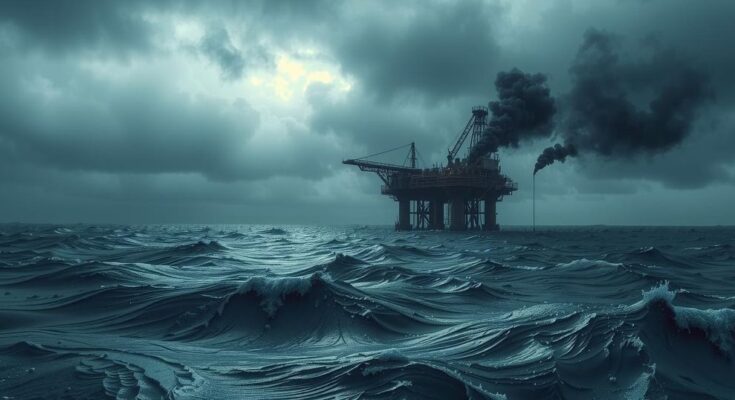A group of 30 migrants is stranded on an offshore platform east of Tunisia, facing worsening health conditions due to lack of food and care. Humanitarian groups are calling for intervention from Italian and Maltese authorities, asserting the migrants’ right to safe port transfers. Concerns of complicity in human rights violations involving the companies operating the platform have also been raised.
A group of 30 migrants are currently stranded on an offshore platform in the Mediterranean, situated approximately 75 miles from the Tunisian coast. As reported by the emergency hotline service Alarm Phone, these individuals have been without food for several days, leading to a rapid deterioration in their health. The conditions aboard the platform, described as inadequate for proper care, further exacerbate the situation.
The migrants reportedly arrived on an inflatable boat, which was later found tethered to the platform. Humanitarian organization Sea-Watch, which visited the site, confirmed that one individual has died due to the severe conditions faced, while many others are suffering from extreme hunger and fatigue.
Aid organizations are urging Italian and Maltese authorities to take urgent action, emphasizing that the migrants are located in international waters within the search and rescue zones of both nations. A spokesperson for Sea-Watch stated, “They have the right to be transferred to a safe port.”
Additionally, human rights advocates have raised concerns regarding the potential complicity of Shell, the platform’s owner, and Amilcar Petroleum Operations, its operator, in human rights violations. They warn that if the migrants are forcibly returned to Libya or Tunisia, it may violate international law, which prohibits returning individuals to countries where they might face persecution or harm.
The situation of the 30 stranded migrants highlights a critical humanitarian crisis, with reports of malnutrition and psychological distress escalating due to their prolonged exposure on the offshore platform. Calls for intervention from Italian and Maltese authorities emphasize the responsibility to ensure the migrants’ safe transfer to port. Furthermore, potential complicity by the companies involved raises significant legal and ethical questions regarding the treatment of migrants within international waters.
Original Source: libyaobserver.ly




